高中英语牛津译林版 模块5 Unit1 Getting along with others Grammar and usage动词不定式课件(共49张)
文档属性
| 名称 | 高中英语牛津译林版 模块5 Unit1 Getting along with others Grammar and usage动词不定式课件(共49张) | 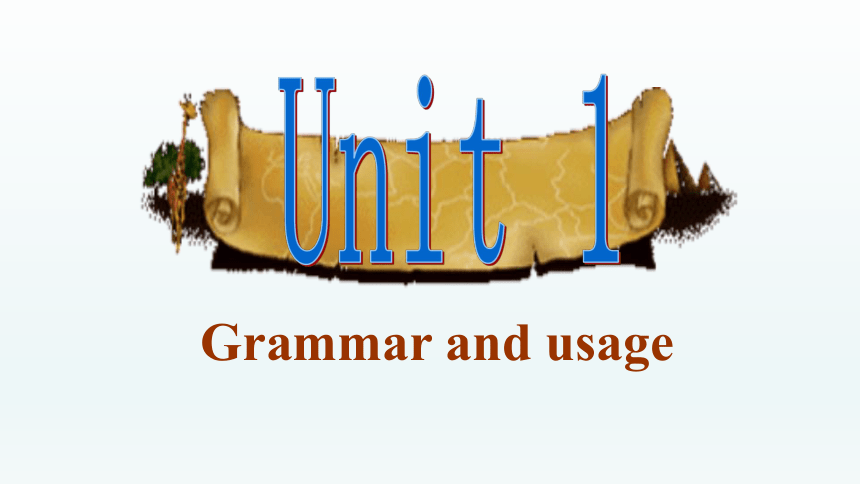 | |
| 格式 | zip | ||
| 文件大小 | 322.4KB | ||
| 资源类型 | 教案 | ||
| 版本资源 | 牛津译林版 | ||
| 科目 | 英语 | ||
| 更新时间 | 2019-04-22 22:35:10 | ||
图片预览

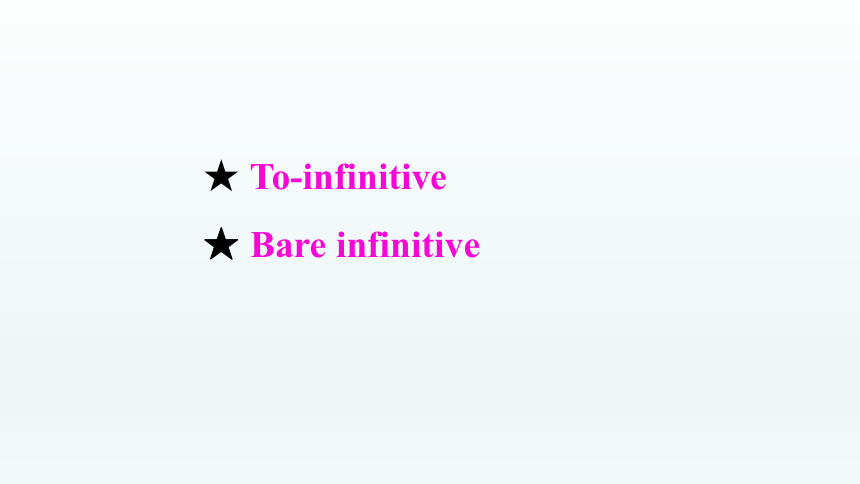
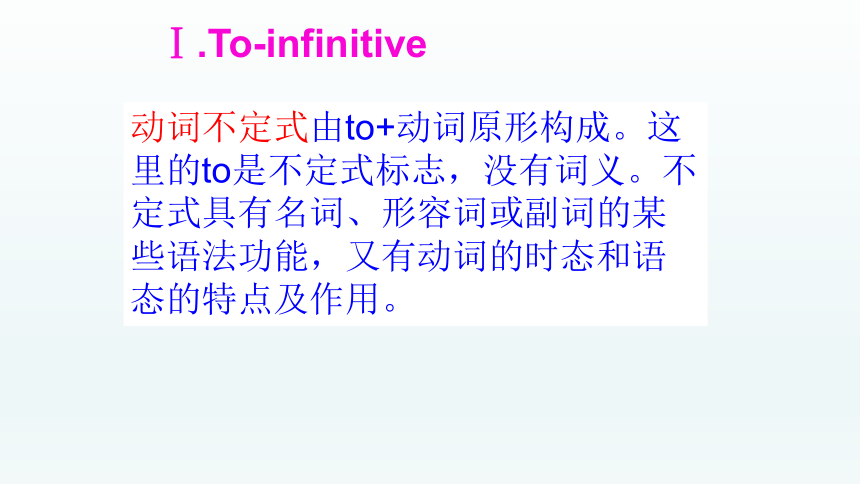
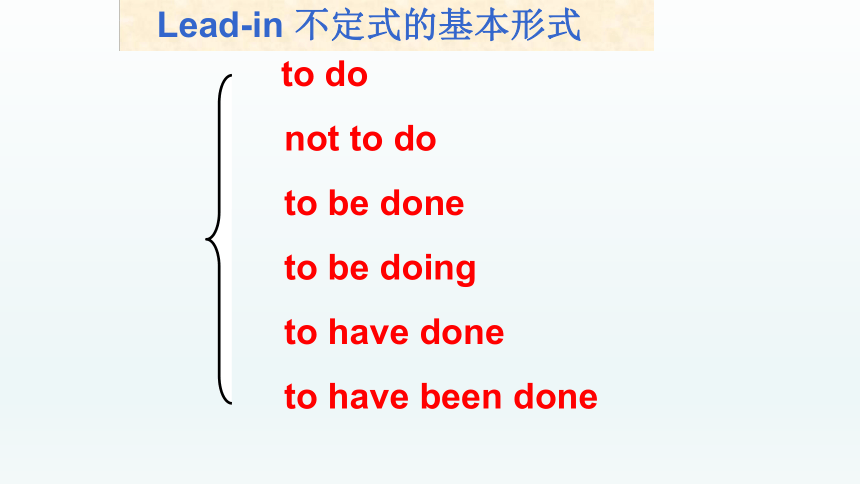
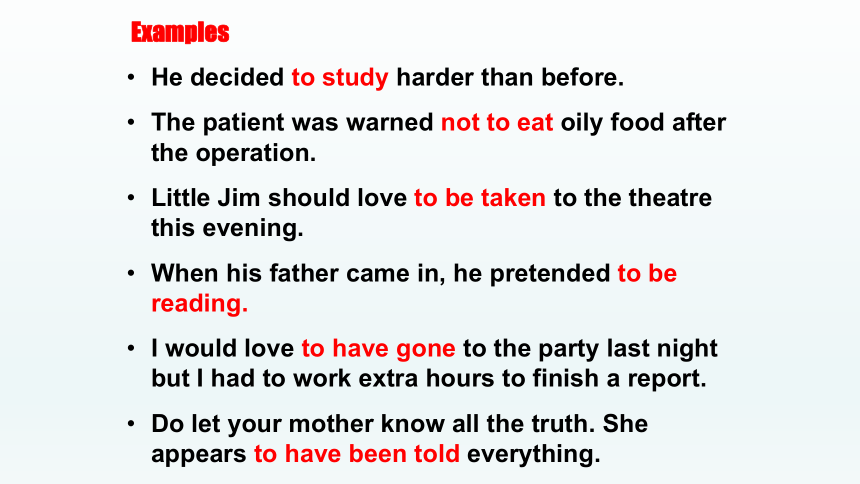




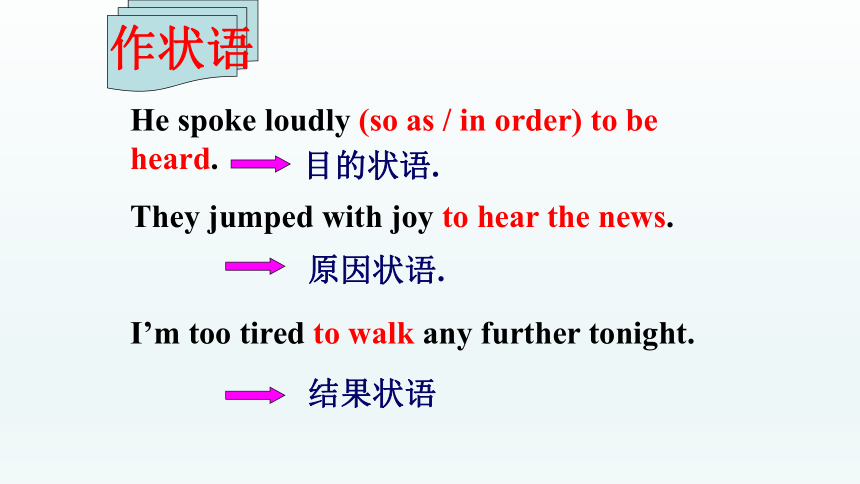

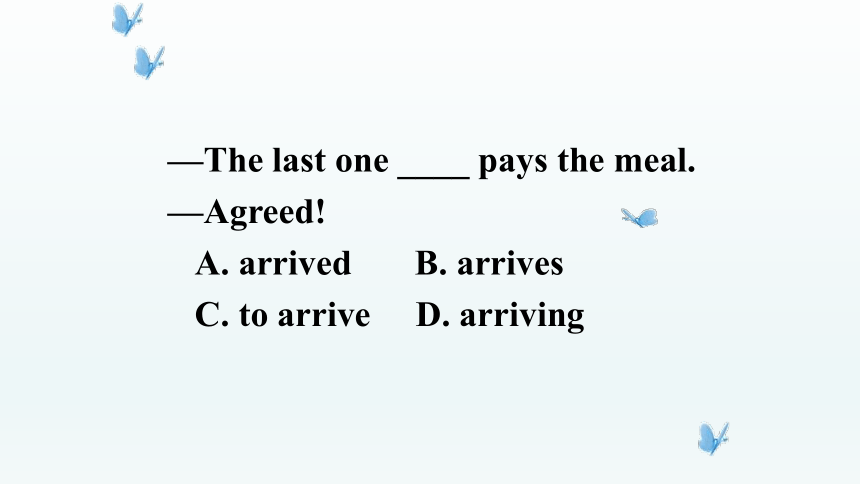
文档简介
课件49张PPT。Grammar and usageUnit 1 ★ To-infinitive
★ Bare infinitive
动词不定式由to+动词原形构成。这里的to是不定式标志,没有词义。不定式具有名词、形容词或副词的某些语法功能,又有动词的时态和语态的特点及作用。Ⅰ.To-infinitive to do
not to do
to be done
to be doing
to have done
to have been done Lead-in 不定式的基本形式 Examples
He decided to study harder than before.
The patient was warned not to eat oily food after the operation.
Little Jim should love to be taken to the theatre this evening.
When his father came in, he pretended to be reading.
I would love to have gone to the party last night but I had to work extra hours to finish a report.
Do let your mother know all the truth. She appears to have been told everything.
作主语To master a foreign language is really important nowadays.
To give up smoking is right.1.当今掌握一门外语真的很重要。2. 放弃吸烟是对的。作宾语Fred didn’t have any money, so he decided to look for a job.He promised not to tell anyone about it.
1. Fred 没有钱,所以他决定找一份工作。2. 他答应不告述任何人这事。作表语My job is to teach English.To see is to believe.1. 我的工作是教英语。2. 眼见为实。作定语Do you have anything to say?1. 你有什么要说的吗?2. Betty是第一个知道这真相的人 Betty was the first to know the truth.作状语He spoke loudly (so as / in order) to be heard.
They jumped with joy to hear the news.
I’m too tired to walk any further tonight.
目的状语.原因状语.结果状语作宾补She asked me to stay there.1. 她叫我呆在这儿。2.请允许我介绍Mr. White给你们。 Please allow me to introduce Mr. White to you.
—The last one ____ pays the meal.
—Agreed!
A. arrived B. arrives
C. to arrive D. arriving
Test yourself 1.She pretended _________ me when I
passed by.
A. not to see B. not seeing
C. to not see D. having not seen
2.--- I usually go there by train.
--- Why not _______ by boat for a
change?
A. to try going B. trying to go
C. to try and go D. try going
3.I went to see him, ________ him out.
A. finding B. find
C. only to find D. found
4.Are you going to attend the meeting ________ next Saturday?
A. holding B. hold
C. will be held D. to be held
5.Charles Babbage is generally considered _________ the first computer.
A. to invent B. inventing
C. to have invented
D. having invented
II. Bare infinitive
We use bare infinitive after let, make and have
eg. I'll let you use my computer.
我会让你用我的电脑的。
Don't make the boy stand all the
time.
别让那个小男孩一直站着。
The teacher had her students finish
the work within 5 minutes.
老师让她的学生们5分钟之内完成作
业。当"make/ let/ have + bare infinitive" 变成被动语态时,应加上"to"。
eg. The workers were made to work 14 hours a day by the boss.
工人们被迫每天工作14个小时。2.We use bare infinitive after verbs of perception like feel, hear, see, watch, observe and notice……
eg. I often hear him sing in the next
room.
我经常听到他在隔壁房间唱歌。
He stood there and watched the
passengers go by.
他站在那儿看着行人来来往往。
Did you notice anyone enter the
house?
你注意到有人进那间屋子吗?3.We use bare infinitive after some phrases or patterns like would rather, had better and why not
eg. I'd rather stay at home.
我宁愿呆在家里。
You'd better not be late.
你最好别迟到。
Why not go to the beach?
为什么不到海边走走?4.We use the bare infinitive for the second infinitive when two infinitives are joined by and, or, except, but, than, rather than, as or like.
eg. I forgot to turn off the lights and close
the door when I left.
我离开的时候忘记关灯、关门了。
We decided to stay at home rather than
go to the cinema.
我们决定呆在家里,不去电影院了。
注意A. 作简短回答或避免不必要的重复时,动词不定式常常省去to 后面的动词,只保留to 。A:Would you like to come to my party?Mary wanted to use my bike, but I asked her not to ( use my bike).B: Yes , I’d love to ( come to your party).Mary想用我的自行车,但我叫她别用。 B. 介词except/ but 之后接不定式时,如果介词前有实意动词do 则except/ but 后接不带to 的不定式;反之,如果except/ but前没有实意动词do,则不定式带to 。
She has no choice but to wait for the news.
The man can do everything but speak French.注意
My parents have always made me ______ about myself, even when I was twelve.
A. feeling well
B. feeling good
C. feel well
D. feel good
---It’s a long time since I saw my sister.
---____ her this weekend?
A. Why not visit
B. why not to visit
C. Why not visiting
D. Why don’t visit
Test yourself1.We were told to have our reading room _________ after school.
A. clean B. to clean
C. cleaning D. cleaned
2.Paul doesn't have to be made _______ . He always works hard.
A. learn B. to learn
C. learned D. learning3.Jane was made ________ the truck for a week as a punishment.
A. to wash B. washing
C. wash D. to be washingIII. Verb-ing form as a noun Verb-ing form used as the subject of a sentence
eg. Laying eggs is the ant queen's full-time
job. 产卵是蚁后的专职工作。
It is no use arguing with him.
与他争辩没用。
Her swimming has improved since she
started training every day. 自从她开始 训练以后,她的游泳进步的很快。
Verb-ing form used as the object of a sentence
eg. I like swimming.
我喜欢游泳。
He has finished writing the composition.
他已经写好了作文。
He is fond of playing football.
他喜欢踢足球。 The following phrases are followed by the verb-ing form:
would you mind, can't help,
look forward to, feel like,
can't stand, it's no use/ good...,
put off, keep on,
give up, devote to,
stick to, be busy,
be worth, get down to … Some verbs can be followed by a verb-ing form or a to-infinitive, but with some differences in meaning or usage. regret to do: 抱歉要做某事
regret doing: 后悔做了某事
eg. I regret to tell you that you
are fired.
我抱歉地告诉你你被解雇了。
I regret telling him the truth.
我后悔告诉他真相。 forget to do: 忘记去做某事
forget doing: 忘记做了某事
eg. He forgot to close the door
when he left.
他离开时忘了关门了。
I will never forget winning my
first gold medal.
我永远忘不了我第一次获得金牌
的情况。 remember to do: 记得要做某事
remember doing: 记得曾经做过的事
eg. Remember to post the letter for
me on your way to work, OK?
在你上班的路上记得帮我把信寄了,
好吗?
I remember seeing this man
somewhere.
我记得在哪儿见过这个人。 mean to do: 打算做某事
mean doing: 意味着做某事
eg. I mean to come earlier today.
我今天打算早点来。
Missing the train means waiting
for another hour.
错过这列火车意味着又要等一个
小时。 try to do: 努力做某事
try doing:尝试做某事
eg. She tried to finish the work as
quickly as she can.
她努力地要尽快完成这项工作。
I tried doing the exercise in a
different way.stop to do: 停下来做某事
stop dong: 停止做某事
eg. The workers stopped to have
a rest.
工人们停下来休息。
The workers stopped working
and have a rest.
工人们停止了手中的活,休息一
下。
go on to do: 继续做另一件事
go on doing: 继续做同一件事
eg. After doing the cooking, mother
went on to do some washing.
饭做好后,妈妈又继续洗衣服了。
The workers went on working after a
short rest.
短暂的休息后,工人们又开始干活
了。 Verb-ing form used as the predicate of a sentence
eg. Her job is teaching.
她的工作是教学。
Seeing is believing.
眼见为实。 Verb-ing form used as the attribute of a sentence
eg. There is a shoe in the swimming pool.
游泳池内有一只鞋。
He is in the reading room.
他在阅览室里。
--- Can I smoke here?
--- Sorry. We don’t allow ______ here.
A. people smoking B. people smoke
C. to smoke D. smoking
— Robert is indeed a wise man.
— Oh, yes. How often have regretted his advice!
A. to take B. taking
C. not to take D. not taking
It remains________ whether Jim will be
fit enough to play in the finals.
A. seen B. to be seen
C. seeing D. to see
Mary, _______ here—everybody else, stay
where you are.
A. come B. comes
C. to come D. coming
Is it time you got down to ___ the papers?
A. mark B. be marked
C. being marked D. marking
Test yourself Go on ______ the other exercise after
you have finished this one.
A. to do B. doing
C. with D. to be doing
She didn't remember________ him
before.
A. having met B. have met
C. to meet D. to having met
Test yourself I can hardly imagine Peter____ across the Atlantic Ocean in five days.
A. sail B. to sail
C. sailing D. to have sailed
--- You were brave enough to raise
objections at the meeting.
--- Well, now I regret _____ that.
A. to do B. to be doing
C. to have done D. having done
Test yourself翻译下列句子。
(1)要学好一门外语是不容易的。
It's not easy to learn a foreign language
well.
(2)我们拒绝他们的邀请会显得无礼。
It would be rude of us to refuse their
invitation
(3)女士们,先生们,我有一些重要的事情要告诉你们。
Ladies and gentlemen, I have something
important to tell you.
(4)母亲轻轻地走了进来,以免惊醒
儿子。
Mother came in quietly so as not to
wake the sleeping boy.
(5)我叫小李给你修收音机。
I'll have Xiao Li repair the radio for
you.Test yourselfBye - bye!
★ Bare infinitive
动词不定式由to+动词原形构成。这里的to是不定式标志,没有词义。不定式具有名词、形容词或副词的某些语法功能,又有动词的时态和语态的特点及作用。Ⅰ.To-infinitive to do
not to do
to be done
to be doing
to have done
to have been done Lead-in 不定式的基本形式 Examples
He decided to study harder than before.
The patient was warned not to eat oily food after the operation.
Little Jim should love to be taken to the theatre this evening.
When his father came in, he pretended to be reading.
I would love to have gone to the party last night but I had to work extra hours to finish a report.
Do let your mother know all the truth. She appears to have been told everything.
作主语To master a foreign language is really important nowadays.
To give up smoking is right.1.当今掌握一门外语真的很重要。2. 放弃吸烟是对的。作宾语Fred didn’t have any money, so he decided to look for a job.He promised not to tell anyone about it.
1. Fred 没有钱,所以他决定找一份工作。2. 他答应不告述任何人这事。作表语My job is to teach English.To see is to believe.1. 我的工作是教英语。2. 眼见为实。作定语Do you have anything to say?1. 你有什么要说的吗?2. Betty是第一个知道这真相的人 Betty was the first to know the truth.作状语He spoke loudly (so as / in order) to be heard.
They jumped with joy to hear the news.
I’m too tired to walk any further tonight.
目的状语.原因状语.结果状语作宾补She asked me to stay there.1. 她叫我呆在这儿。2.请允许我介绍Mr. White给你们。 Please allow me to introduce Mr. White to you.
—The last one ____ pays the meal.
—Agreed!
A. arrived B. arrives
C. to arrive D. arriving
Test yourself 1.She pretended _________ me when I
passed by.
A. not to see B. not seeing
C. to not see D. having not seen
2.--- I usually go there by train.
--- Why not _______ by boat for a
change?
A. to try going B. trying to go
C. to try and go D. try going
3.I went to see him, ________ him out.
A. finding B. find
C. only to find D. found
4.Are you going to attend the meeting ________ next Saturday?
A. holding B. hold
C. will be held D. to be held
5.Charles Babbage is generally considered _________ the first computer.
A. to invent B. inventing
C. to have invented
D. having invented
II. Bare infinitive
We use bare infinitive after let, make and have
eg. I'll let you use my computer.
我会让你用我的电脑的。
Don't make the boy stand all the
time.
别让那个小男孩一直站着。
The teacher had her students finish
the work within 5 minutes.
老师让她的学生们5分钟之内完成作
业。当"make/ let/ have + bare infinitive" 变成被动语态时,应加上"to"。
eg. The workers were made to work 14 hours a day by the boss.
工人们被迫每天工作14个小时。2.We use bare infinitive after verbs of perception like feel, hear, see, watch, observe and notice……
eg. I often hear him sing in the next
room.
我经常听到他在隔壁房间唱歌。
He stood there and watched the
passengers go by.
他站在那儿看着行人来来往往。
Did you notice anyone enter the
house?
你注意到有人进那间屋子吗?3.We use bare infinitive after some phrases or patterns like would rather, had better and why not
eg. I'd rather stay at home.
我宁愿呆在家里。
You'd better not be late.
你最好别迟到。
Why not go to the beach?
为什么不到海边走走?4.We use the bare infinitive for the second infinitive when two infinitives are joined by and, or, except, but, than, rather than, as or like.
eg. I forgot to turn off the lights and close
the door when I left.
我离开的时候忘记关灯、关门了。
We decided to stay at home rather than
go to the cinema.
我们决定呆在家里,不去电影院了。
注意A. 作简短回答或避免不必要的重复时,动词不定式常常省去to 后面的动词,只保留to 。A:Would you like to come to my party?Mary wanted to use my bike, but I asked her not to ( use my bike).B: Yes , I’d love to ( come to your party).Mary想用我的自行车,但我叫她别用。 B. 介词except/ but 之后接不定式时,如果介词前有实意动词do 则except/ but 后接不带to 的不定式;反之,如果except/ but前没有实意动词do,则不定式带to 。
She has no choice but to wait for the news.
The man can do everything but speak French.注意
My parents have always made me ______ about myself, even when I was twelve.
A. feeling well
B. feeling good
C. feel well
D. feel good
---It’s a long time since I saw my sister.
---____ her this weekend?
A. Why not visit
B. why not to visit
C. Why not visiting
D. Why don’t visit
Test yourself1.We were told to have our reading room _________ after school.
A. clean B. to clean
C. cleaning D. cleaned
2.Paul doesn't have to be made _______ . He always works hard.
A. learn B. to learn
C. learned D. learning3.Jane was made ________ the truck for a week as a punishment.
A. to wash B. washing
C. wash D. to be washingIII. Verb-ing form as a noun Verb-ing form used as the subject of a sentence
eg. Laying eggs is the ant queen's full-time
job. 产卵是蚁后的专职工作。
It is no use arguing with him.
与他争辩没用。
Her swimming has improved since she
started training every day. 自从她开始 训练以后,她的游泳进步的很快。
Verb-ing form used as the object of a sentence
eg. I like swimming.
我喜欢游泳。
He has finished writing the composition.
他已经写好了作文。
He is fond of playing football.
他喜欢踢足球。 The following phrases are followed by the verb-ing form:
would you mind, can't help,
look forward to, feel like,
can't stand, it's no use/ good...,
put off, keep on,
give up, devote to,
stick to, be busy,
be worth, get down to … Some verbs can be followed by a verb-ing form or a to-infinitive, but with some differences in meaning or usage. regret to do: 抱歉要做某事
regret doing: 后悔做了某事
eg. I regret to tell you that you
are fired.
我抱歉地告诉你你被解雇了。
I regret telling him the truth.
我后悔告诉他真相。 forget to do: 忘记去做某事
forget doing: 忘记做了某事
eg. He forgot to close the door
when he left.
他离开时忘了关门了。
I will never forget winning my
first gold medal.
我永远忘不了我第一次获得金牌
的情况。 remember to do: 记得要做某事
remember doing: 记得曾经做过的事
eg. Remember to post the letter for
me on your way to work, OK?
在你上班的路上记得帮我把信寄了,
好吗?
I remember seeing this man
somewhere.
我记得在哪儿见过这个人。 mean to do: 打算做某事
mean doing: 意味着做某事
eg. I mean to come earlier today.
我今天打算早点来。
Missing the train means waiting
for another hour.
错过这列火车意味着又要等一个
小时。 try to do: 努力做某事
try doing:尝试做某事
eg. She tried to finish the work as
quickly as she can.
她努力地要尽快完成这项工作。
I tried doing the exercise in a
different way.stop to do: 停下来做某事
stop dong: 停止做某事
eg. The workers stopped to have
a rest.
工人们停下来休息。
The workers stopped working
and have a rest.
工人们停止了手中的活,休息一
下。
go on to do: 继续做另一件事
go on doing: 继续做同一件事
eg. After doing the cooking, mother
went on to do some washing.
饭做好后,妈妈又继续洗衣服了。
The workers went on working after a
short rest.
短暂的休息后,工人们又开始干活
了。 Verb-ing form used as the predicate of a sentence
eg. Her job is teaching.
她的工作是教学。
Seeing is believing.
眼见为实。 Verb-ing form used as the attribute of a sentence
eg. There is a shoe in the swimming pool.
游泳池内有一只鞋。
He is in the reading room.
他在阅览室里。
--- Can I smoke here?
--- Sorry. We don’t allow ______ here.
A. people smoking B. people smoke
C. to smoke D. smoking
— Robert is indeed a wise man.
— Oh, yes. How often have regretted his advice!
A. to take B. taking
C. not to take D. not taking
It remains________ whether Jim will be
fit enough to play in the finals.
A. seen B. to be seen
C. seeing D. to see
Mary, _______ here—everybody else, stay
where you are.
A. come B. comes
C. to come D. coming
Is it time you got down to ___ the papers?
A. mark B. be marked
C. being marked D. marking
Test yourself Go on ______ the other exercise after
you have finished this one.
A. to do B. doing
C. with D. to be doing
She didn't remember________ him
before.
A. having met B. have met
C. to meet D. to having met
Test yourself I can hardly imagine Peter____ across the Atlantic Ocean in five days.
A. sail B. to sail
C. sailing D. to have sailed
--- You were brave enough to raise
objections at the meeting.
--- Well, now I regret _____ that.
A. to do B. to be doing
C. to have done D. having done
Test yourself翻译下列句子。
(1)要学好一门外语是不容易的。
It's not easy to learn a foreign language
well.
(2)我们拒绝他们的邀请会显得无礼。
It would be rude of us to refuse their
invitation
(3)女士们,先生们,我有一些重要的事情要告诉你们。
Ladies and gentlemen, I have something
important to tell you.
(4)母亲轻轻地走了进来,以免惊醒
儿子。
Mother came in quietly so as not to
wake the sleeping boy.
(5)我叫小李给你修收音机。
I'll have Xiao Li repair the radio for
you.Test yourselfBye - bye!
